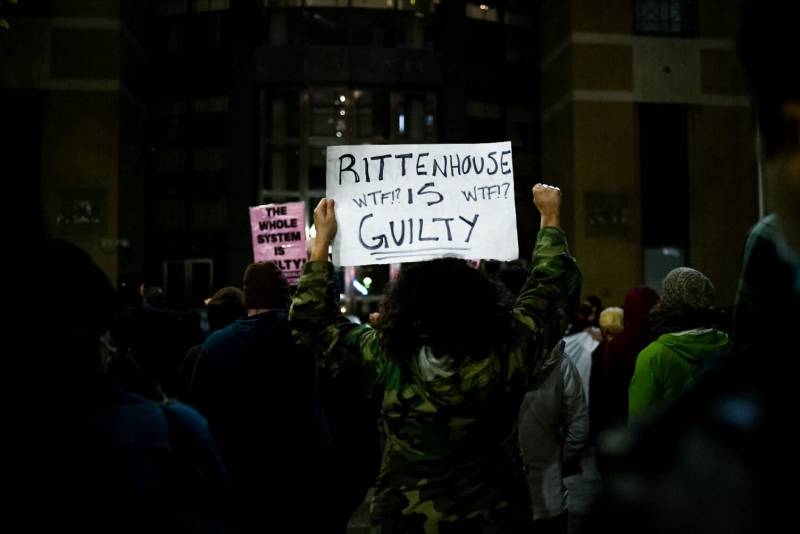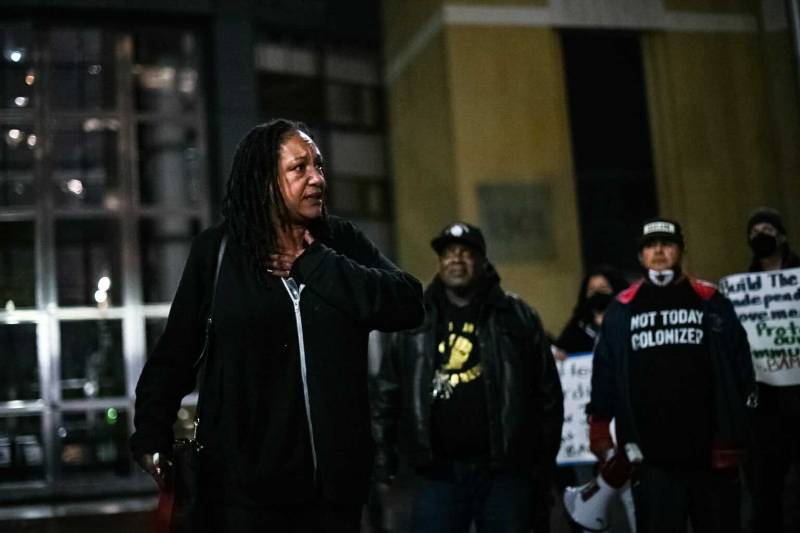Bay Area civil rights activists and elected leaders reacted with outrage and disappointment Friday to the acquittal of Kyle Rittenhouse, the white teenager who last year shot and killed two people protesting police violence in Kenosha, Wisconsin.
'They Can Literally Get Away With Murder': Bay Area Activists, Leaders React to Rittenhouse Not Guilty Verdict

Cat Brooks, a longtime Oakland activist and co-founder of the Anti Police-Terror Project, told KQED that while the news felt like “a punch in the gut,” she was hardly surprised.
Brooks noted that the verdict highlights a glaring contradiction in the U.S. criminal justice system that she said treats white defendants with much greater leniency than it does people of color, particularly Black people.”If you look who’s funneled into American prisons and if you look whose lives are protected and defended inside of our courtrooms, we see grave disparities where Black, Indigenous and other people of color always end up with the short end of the stick,” she said.

Rittenhouse, 18, was found not guilty of all charges Friday after pleading self-defense in the deadly August 2020 shootings that became a flashpoint in the debate over guns, vigilantism and racial injustice in the U.S.
Organizers and community leaders will continue fighting against racial injustice nationwide, Brooks insisted, despite the profound discouragement from verdicts like this one. Large demonstrations against the verdict are expected to place in scores of cities across the country, including one planned for downtown Oakland on Friday evening.
But Brooks said she is also increasingly concerned that Rittenhouse’s acquittal could encourage further violence from white nationalists.
“White supremacists, right-wing extremists … are watching these trials closely to see what they can get away with,” Brooks said. “And the message that was sent today is that they can literally get away with murder.”
Rittenhouse, who was 17 at the time of the shooting, was charged with homicide, attempted homicide and reckless endangerment for killing two men with an AR-style semi-automatic rifle, and wounding a third, during a tumultuous night of protests over the shooting of Jacob Blake, a Black man, by a white Kenosha police officer.
A former police youth cadet from Illinois, Rittenhouse claimed he had gone to Kenosha to protect property from rioters.
The anonymous jury, whose racial makeup was not disclosed by the court, but appeared from media reports to be overwhelmingly white, deliberated for close to 3 1/2 days.
Rittenhouse could have gotten life in prison if found guilty on the most serious charge, first-degree intentional homicide, or what some other states call first-degree murder. Two other charges each carried over 60 years behind bars.
“The fact that … the taking of two lives is not worthy of any punishment, it’s not worthy of any consequences has sent a chilling message, particularly in a time where we see white supremacy rising,” former Stockton Mayor Michael Tubbs told KQED’s Forum on Friday, after learning of the verdict.
“As human beings, but also as Americans, we should continually be in a state of outrage and deep mourning when our justice system illustrates that once again it does not work the same for everyone,” he said.
Many on the right, meanwhile, who have hailed Rittenhouse as a hero and condemned the trial throughout, celebrated the verdict.
Mark McCloskey, who got in trouble with the law when he and his wife waved a rifle and a handgun at Black Lives Matter protesters marching past his St. Louis home in 2020, said the verdict shows that people have a right to defend themselves from a “mob.” He is now a Republican candidate for U.S. Senate in Missouri.
President Biden was quick to call for calm, saying that while the outcome of the case “will leave many Americans feeling angry and concerned, myself included, we must acknowledge that the jury has spoken.”
But many elected leaders in the Bay Area and California immediately condemned the verdict.
“America today … you can break the law, carry around weapons built for a military, shoot and kill people, and get away with it,” Gov. Gavin Newsom said in Tweet. “That’s the message we’ve just sent to armed vigilantes across the nation.”
That outrage was echoed on Twitter by a number of Bay Area leaders, including San José Mayor Sam Liccardo and Oakland Mayor Libby Schaaf.
“Today’s verdict gives vigilantism a free pass and fortifies white privilege,” Schaaf said. “It’s further evidence of a broken justice system, and it should only encourage us to fight harder for a more just and equitable America.”
State Sen. Scott Wiener, D-San Francisco, said the case underscored the systemic inequalities in America’s justice system.
“Our racist justice system has once again profoundly failed the American people,” he said on Twitter.
The Kenosha case was part of an extraordinary confluence of trials that reflected the deep divide over race in the United States: In Georgia, three white men are on trial in the killing of Ahmaud Arbery, while in Virginia, a trial is underway in a lawsuit over the deadly white-supremacist rally held in Charlottesville in 2017.
The bloodshed in Kenosha took place during a summer of protests set off across the U.S. after George Floyd was killed by Minneapolis police that May, and other cases where Black people lost their lives at the hands of mostly white police officers.
Rittenhouse went to Kenosha, joining other armed civilians on the streets, after businesses there were ransacked and burned in the nights that followed Blake’s shooting. Authorities said the weapon the 17-year-old used was illegally purchased.
Bystander and drone video captured most of the frenzied chain of events that followed: Rittenhouse killed Joseph Rosenbaum, 36, then shot to death protester Anthony Huber, 26 — both of whom were white — and wounded demonstrator Gaige Grosskreutz, now 28, who is also white.
At trial, prosecutors portrayed Rittenhouse as a “wannabe soldier” who had gone looking for trouble that night and was responsible for creating a dangerous situation in the first place by pointing his rifle at demonstrators.
But Rittenhouse testified he came under attack: “I didn’t do anything wrong. I defended myself,” he said in court.
Breaking into sobs at one point, he told the jury he opened fire after Rosenbaum chased him and made a grab for his gun, and said he was afraid his rifle was going to be wrested away and used to kill him.
Huber was then killed after hitting Rittenhouse in the head or neck with a skateboard, and Grosskreutz was shot after pointing a gun of his own at Rittenhouse.
After the verdict, Huber’s parents, Karen Bloom and John Huber, said the outcome “sends the unacceptable message that armed civilians can show up in any town, incite violence, and then use the danger they have created to justify shooting people in the street.”
At the onset of the trial, many legal experts said they believed the defense had the advantage because of provisions favorable to Rittenhouse in Wisconsin’s self-defense law, and because of video showing him being chased. Testimony from some of the prosecution’s own witnesses also seemed to buttress his claim of self-defense.
Kenosha County Circuit Court Judge Bruce Schroeder also made several controversial decisions that some observers argue worked in Rittenhouse’s favor, including allowing the defendant to draw numbers from a barrel to determine which jurors would serve as alternates. Before the trial even began, the judge ruled prosecutors couldn’t argue that Rittenhouse was affiliated with the far-right Proud Boys group or that he attacked a woman months before the shootings. Nor would he permit prosecutors to refer to those shot by Rittenhouse as “victims” — “a loaded, loaded word,” he said — although he did allow defense lawyers to refer to them as “arsonists” and “looters” if they could prove the men had taken part in such activities.
Rittenhouse had also been charged with possession of a dangerous weapon by a person under 18, a misdemeanor that carries nine months behind bars and appeared likely to lead to a conviction.
But the judge threw out that charge before deliberations after the defense argued that the Wisconsin law did not apply to the kind of long-barreled rifle Rittenhouse used.
This post includes reporting from the Associated Press and KQED’s Mina Kim, Kate Wolffe, Carlos Cabrera-Lomelí and Matthew Green.
